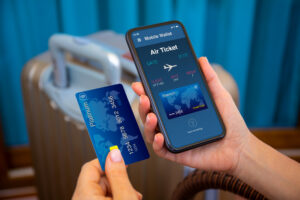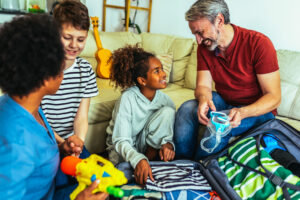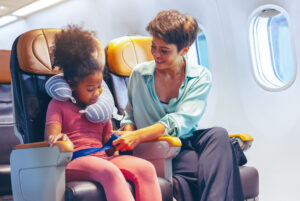While it is impossible to foresee every scenario or emergency, as a flight attendant, I would like to share some tips for parents traveling on a plane with an autistic child.
Booking your flight
- Notify your airline at the time of booking about your need for assistance and any accommodations they can provide such as a quiet place to check in, an escort through the airport, an expedited screening, transportation to the gate, special carry-on allowance, pre-boarding, special meals, or a specific seat assignment.
- Notify the TSA Cares at least three days in advance of your travel and ask for a passenger support specialist, who can provide on-the-spot assistance. Ask about the best way to relieve any concerns you may have during the screening process.
- Print out a TSA notification card to present to the TSA officer, along with other medical documentation to describe your loved one’s condition.
 Consider opting for a flight that leaves at night so your loved one will fall asleep faster and have smaller crowds to deal with.
Consider opting for a flight that leaves at night so your loved one will fall asleep faster and have smaller crowds to deal with.- Window seats are usually hard to come by, followed by aisle seats. Make sure that at least one of the seats you reserve is a window seat. Once you board the plane, you can determine whether your child likes sitting at the window and looking out of the plane. Sitting by the window and watching the view can be a helpful distraction.
- If your child is likely to kick, ask for bulkhead seats so as not to annoy other passengers. It is better to pay to book seats in advance than have an uncomfortable situation. On an empty flight, please be aware that certain seats cost more and are considered an upgrade. Even if they remain empty, flight attendants are not allowed to upgrade passengers without payment or permission.
- If your child won’t sit next to a stranger or would be irritated about having to get up for someone to use the restroom, consider the window seat. If you know your child would be better getting up to walk around or would frequently need to use the lavatory, consider an aisle seat.
- If you’re taking a long flight, ask your reservation agent whether food will be served. If so, consider requesting a special meal, especially for special dietary needs, such as gluten free.
Preparing your loved one
- Practice air travel through rehearsal programs such as Wings for All. Each airline also provides its own program for travelers with special needs, so check with your airline to participate.
- If a rehearsal program is not available or you fly out of a smaller “hub” airport, create your own rehearsal by visiting the airport with your loved one. Walk around and ask questions and get a feel for the environment. Watch airplanes take off and land. Go inside the airport and if you are allowed, record a video of the surroundings. Watch as travelers go through the security system. Point out how the TSA checks every person for safety.
- Find the airport layout online, create a map and/or a schedule, create a social narrative using photos, and/or watch online videos about air travel. The Autism Society of North Carolina website provides a sample narrative about traveling by plane.
- Use video modeling or role playing to explain to your loved one that he or she may be frisked upon entering the airport. Discuss how he or she is expected to react during the frisking but assure your child that everything will be fine.
Packing
- Bring proper identification, medications, doctor’s note or diagnosis, phone numbers in case of emergency and a family emergency plan.
- If your child tends to wander, have a safety plan with critical information with you. Consider a tracking device or wearable ID tags and make sure your child always has ID on him/her. You can order free ID cards on the ASNC website.
- Consider making little cards, like a business card, that state something like: “My child has autism and sensory processing difficulties. He does not mean to be rude and may not answer when spoken to. He doesn’t deal well with lines or crowds of people. He is not being naughty but sometimes everything gets to be too overwhelming! Thank you for your patience.”
- Dress comfortably in layers. Even in the summer, once in the air, the temperature inside the airplanes is often cold.
 Think about the sensory overload at airports with the lights, crowds, lines, smells of people and food, loud speaker, buzzers, and the touch of a tightened seatbelt or by TSA officers. Prepare appropriate coping strategies. For example, bring ear plugs, noise canceling head phones, MP3 player of favorite music, filters or dark sunglasses, bring a favorite fidget or toy, electronics or whatever calms your child, especially for delays, wait times, long flights, etc. Bring a favorite small blanket to wrap up in or cover up if cold or air vents can’t be redirected.
Think about the sensory overload at airports with the lights, crowds, lines, smells of people and food, loud speaker, buzzers, and the touch of a tightened seatbelt or by TSA officers. Prepare appropriate coping strategies. For example, bring ear plugs, noise canceling head phones, MP3 player of favorite music, filters or dark sunglasses, bring a favorite fidget or toy, electronics or whatever calms your child, especially for delays, wait times, long flights, etc. Bring a favorite small blanket to wrap up in or cover up if cold or air vents can’t be redirected.- Don’t forget chewing gum, candy, and lollipops for aiding in equalizing the ears!
- Prepare for delays and the length of your flight. Come armed with extra books, toys, DVDs, and electronic recharging accessories. Don’t forget coloring books, drawing pad along with crayons pencils or a book if he/she loves reading or finds being read to soothing! I’ve seen parents bring playdoh, therapy putty or a small LEGO set to build!
- Always have a change of clothes in case of spills.
- I cannot stress enough to ALWAYS bring plenty of your own food and snacks, especially if you have special dietary requirements. If you’ve ordered a special meal, ask about it upon check in at the ticket counter. Special meals require 24-hour notice and cannot be ordered at the last minute! Airplanes are not 100% stocked with food/snacks and often run out of items. Be prepared that you may not get your first choice in meal options, and the flight attendants may run out of certain types of drinks.
- Remember to check with TSA rules about allowed quantities and allowed items. You may need documentation to bring in medically necessary items.
- Alternatively, remember you can bring food from home or purchase items at the airport after you pass through security.
At the airport and on the plane
- Ask for priority boarding when you check in or drop your bags off at the airport, or even the staff at the gate where you board. This way, you can settle your child on an empty plane before crowds of people pack into the aisles. If you are late for some reason, then board last, when everyone else is seated!
- Be aware that if there is an aircraft change, the seat configuration can be different. Ask the gate agent before boarding whether you still have your requested seats. Once you are on the aircraft, it can be too late to switch seats.
- It is a misconception that flight attendants should or can stow your bags for you. We can “assist and direct customers” but not stow it without your participation and help, because the company will not cover us if we are injured by lifting heavy bags into the overhead compartments.
- All relevant parties need to be aware of any travelers on the spectrum, including the flight attendants. However, be mindful that boarding is a busy and stressful time for everyone, including your flight crew. If the crew has not already been notified, it is helpful if you can wait until after takeoff or ask to speak to the purser (lead flight attendant) to notify them or express your concerns.
- Provide your flight crew with specific instructions and recommendations (keep it short and simple) along with any sensory inputs that we might take for granted — sights and sounds, intercom announcements, lights, video monitors, safety demonstrations, proximity of other passengers, and more.
 Remember that airplane restrooms are very tight spaces. Notify your flight attendants if your child cannot use the restroom alone or if he/she cannot be left alone while you use it. Always instruct and suggest how the flight attendant should preoccupy your child.
Remember that airplane restrooms are very tight spaces. Notify your flight attendants if your child cannot use the restroom alone or if he/she cannot be left alone while you use it. Always instruct and suggest how the flight attendant should preoccupy your child.- Prepare your child for the loud noise and rumbling that occurs during takeoff and landing and be ready with several types of distractions.
- Prepare a social narrative to tell your child about the ear sensation and how he or she might feel upon descent of the aircraft. Air pressure in the ears can be equalized by swallowing or chewing, so telling your child a story about the feeling and how it can go away with chewing gum, sucking on a lollipop or lifesaver, eating, and drinking.
- Explain turbulence to your child and what is required when the plane goes through turbulence. Have them practice fastening their seat belt and explain how important it is that they keep their seat belt on, like in the car!
- Once on board, you will want to point out important features such as the seat belt sign, the air sickness bag, and the location of the restrooms.
- Prepare and make your child aware that they will likely be required to turn off large electronic devices during taxi, take-off, and landing with social narratives or FIRST/THEN cards.
- Some airlines provide a kid’s pack on the airplane, with a coloring book and a set of crayons. Ask whether yours does.
- Remember to give your child explicit expectations of their behavior for the flight. Positive behaviors might include sitting with a seat belt on, quiet hands, quiet feet, watching a movie quietly, reading quietly, sharing, using manners, voice level (inside voice), and special requirements during turbulence.
- Remember to praise and reward your child for positive behavior on the airplane. Consider bringing a reward for good behavior. At the end of a successful flight, provide something special to reinforce that good behavior.
Those with autism tend to pick up on the stress of others; therefore, remain calm and AUTISM ON! Your flight attendants will appreciate it, too.
For even more tips, check out this travel guide.
Bobbi Wells, an Autism Resource Specialist in the Eastern region, can be reached at 252-722-2058 or bwells@autismsociety-nc.org.
Tags: ASNC, Asperger Syndrome, Asperger's Syndrome, autism, autism anxiety, autism asperger parenting tips, autism behavior, autism communication, autism nc, autism north carolina, autism society north carolina, autism society of NC, Autism Society of North Carolina, Autism spectrum, Autism Spectrum Disorder, Autism Spectrum Disorders, autism travel, Developmental disability Go back

